This guide walks you through exactly how to get on podcasts as a guest in 2026. It’s built on hard-won lessons from helping hundreds of founders, PR pros and marketing teams run successful guesting campaigns.
Since 2020 when we founded Rephonic, we’ve believed that getting booked on podcasts should be a strategic, deliberate decision. If you want results, it’s worth treating podcast guesting like a proper marketing or PR campaign rather than a side hobby.
So let’s walk through the key decisions you should make before you start landing those interviews!
Key Takeaways
- Podcast guesting isn't for everyone.
- Choose between five ways of finding podcasts: manual, agencies, podcast databases, Facebook and Reddit groups, and matchmaking sites.
- A good place to start is exploring competitor guest appearances.
- Using solid data to determine if a podcast is well-suited or not is key to increasing your booking rate.
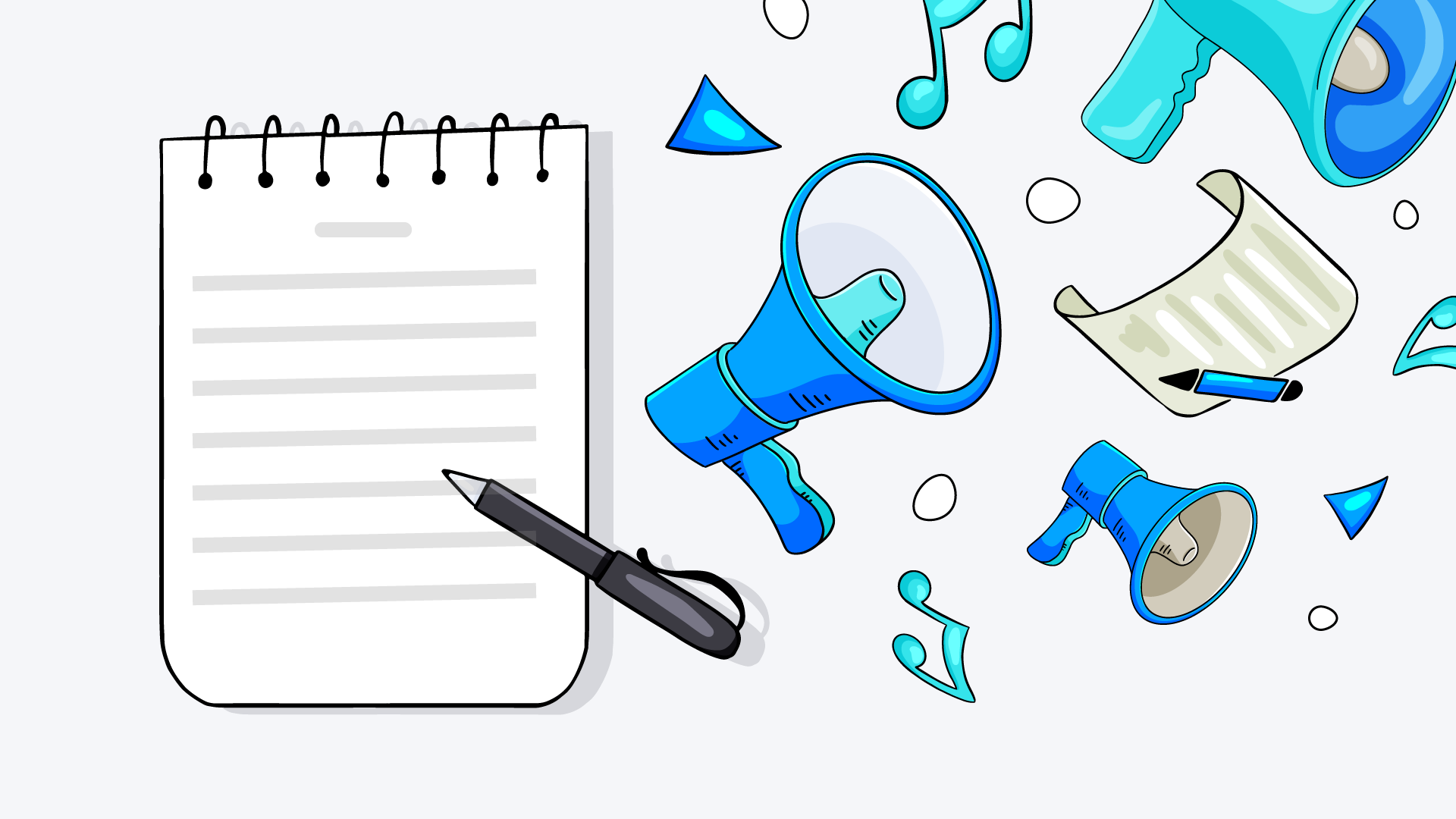
Table of Contents
Who should book podcast interviews, and why?
Is it really worth getting into podcast guesting?
We think so.
Guesting lets you borrow an engaged audience that already knows and trusts the host. They're willing to listen to and learn from that guest, simply because the host has invited them onto the show.
Interviews are not about advertising a product (even if generating leads is the ultimate goal.) Instead, they're all about giving value to the host and their audience.
Telling stories, relating experiences, talking about mistakes and lessons learned. Maybe making them laugh, gasp, or even shed a tear. In return, you get to speak to dozens, hundreds, maybe even thousands of people who are likely to care about your message and need your products or services.
They learn your name, what you do and what you stand for.
In other words, they get to know, like and trust you by listening to (or watching) your interview in a setting where they already feel comfortable. That's a powerful reason right there, because it means they might think of you when they experience the problems you solve.
Longevity counts, too. Podcast episodes stick around for a long time in podcast apps all around the world. That means people can discover your interviews months or even years after they were released.
People who want to book podcast interviews tend to be:
- Founders, entrepreneurs and business leaders
- Agencies (including PR agencies, marketing agencies, and podcast agencies)
- In-house Marketing and PR teams
- Podcasters
- Authors
But even if you're not one of these, there are still plenty of reasons to consider being a podcast guest.
Educational institutions, teachers and specialists, book publishers, musicians, preachers, politicians... anyone with interesting stories can make a good podcast guest if they choose shows with the right audiences.
Here's what you could achieve through podcast guesting:
Build thought leadership or a personal brand
Founders, agencies, and PR or marketing teams often book podcast guest interviews to grow a personal brand—whether their own or a client’s—or to build thought leadership.
Investor, author and philanthropist Alex Hormozi is a great example of a founder who intentionally uses his podcast appearances to build his personal brand. In this 2024 case study, we dug into Rephonic's data to uncover five significant ways that Alex's podcast guest appearances are paying off.
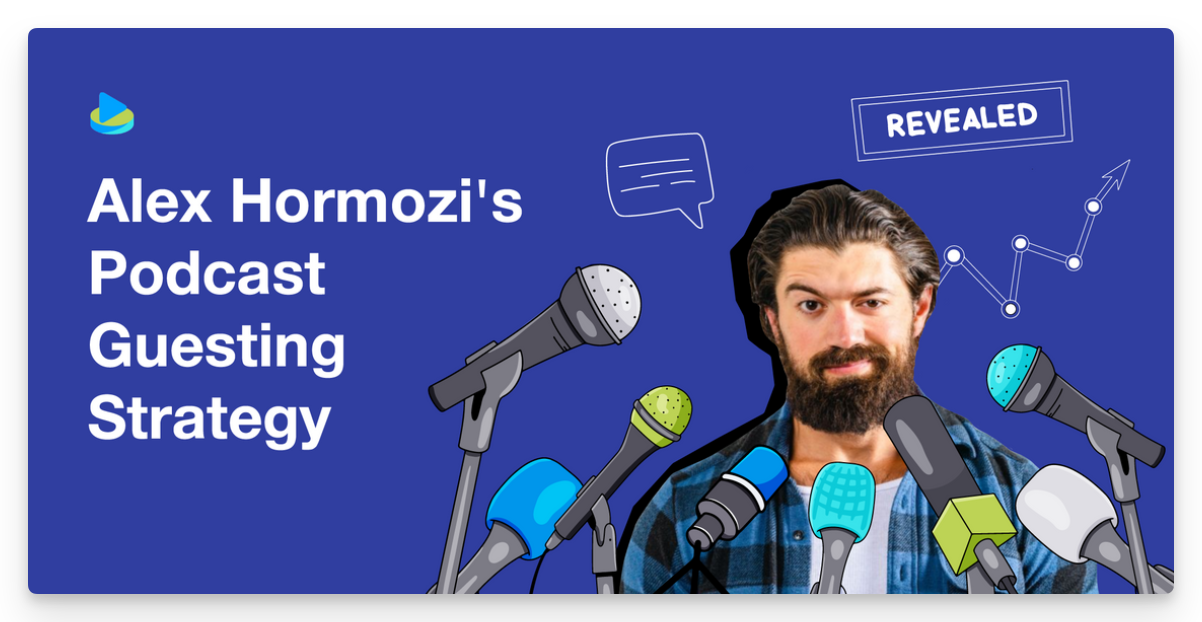
Generate clients, customers or sales
Choose shows whose audience will resonate with your message.
Yes, your ultimate goal is selling products, services or books but podcast guesting isn't about getting a quick win (although that sometimes happens, too.) Podcast guesting is a longer game, The goal for you (or your clients) is to create a great impression and become known, respected and trusted in that niche or industry.
Sometimes you'll gather leads directly from an interview, through a landing page or unique discount code. Other times listeners act after they've heard several of your podcast interviews. That's definitely something solopreneur Talya Heller noticed after she'd notched up a few guest appearances on relevant podcasts in her B2B marketing niche.
The appearances themselves have made it much easier for me to close business because they give people who potentially want to work with you a better sense of who you are and what it's going to be like to work with you. I think it makes them feel like it's less of a risk.
However, a result might not come from the listeners. Sometimes, guests bond with the podcast hosts who either recommend them to other podcasts or even become clients themselves.
Network and form partnerships
Being a guest on a podcast brings opportunities for networking and building relationships. Podcast hosts talk to a range of guests in their niche and may introduce you to those they've formed connections with, especially if you've gone out of your way to be great podcast guest.
They talk to other podcast hosts, too. If a host gets positive feedback from their podcast listeners, they're likely to recommend you to other hosts too.
Enhance SEO
I've used Rephonic to grow my business with guest appearances and gain SEO backlinks. Podcasts are now the top driver for traffic to my website.
In SEO, the more high-quality backlinks you get to your website the better.
Search engines view quality backlinks as endorsements of your site’s content. So, podcast links signal that your content is trustworthy and valuable, which leads to more visibility for your site. Let hosts know which links you want to promote and they’ll often include them as backlinks in their episode show notes.
Here's a screenshot of a few podcast backlinks that Hormozi's website has received:
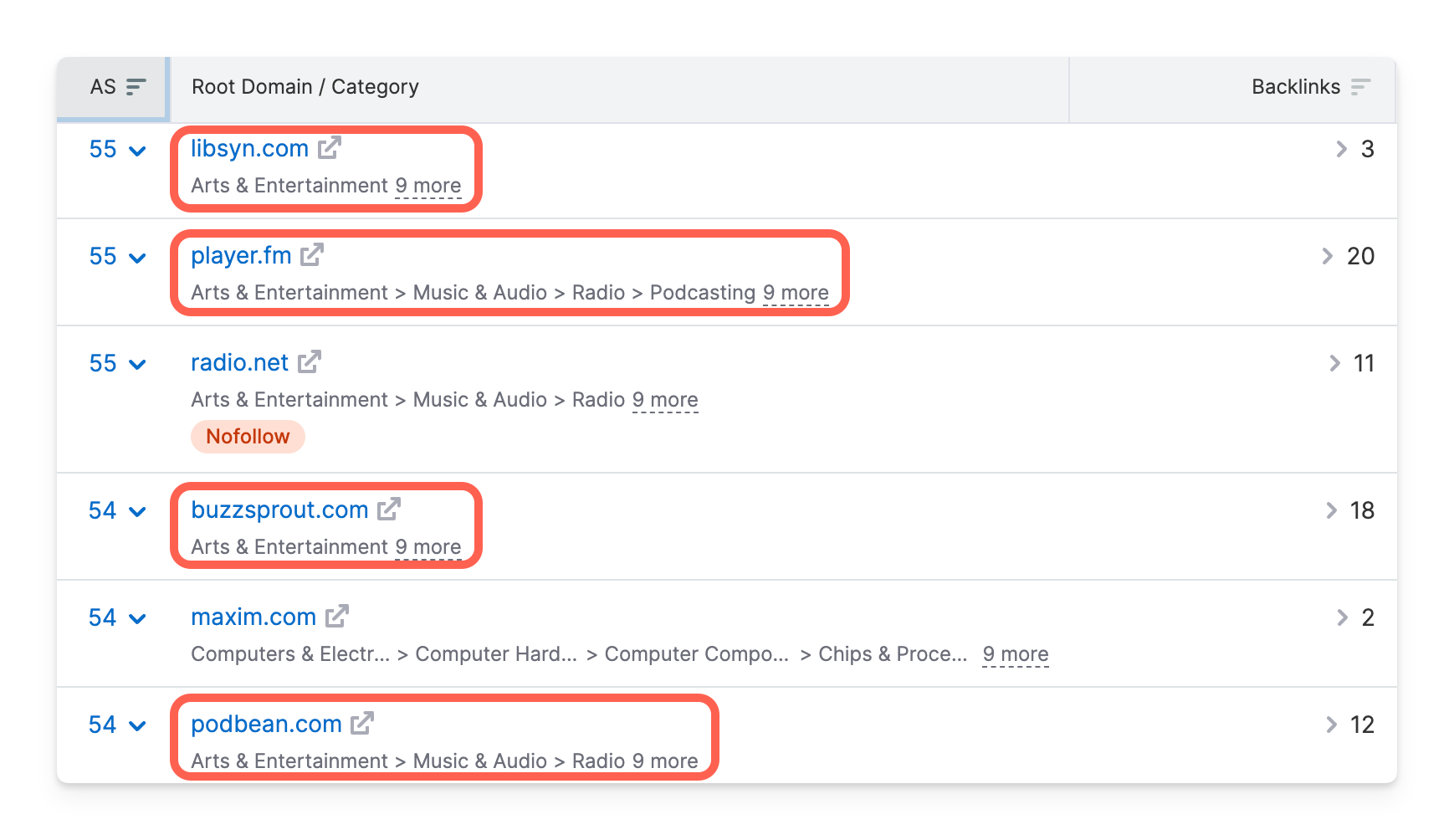
Increase podcast listeners
Podcast hosts and publishers can grow their audience by making guest appearances on other podcasts with similar listeners.
Increasing your listener numbers makes it easier to attract sponsors, sell merchandise or promote your online courses.
If you have your own podcast, consider cross-promoting your show with other podcasters. This could be as simple as recommending each other, but works even better if you each appear as a guest on each other's shows.

Decide if podcast guesting is right for you

#1. Start by clarifying your goals. Like we discussed above, being a podcast guest could work well for you if you want to:
- Build thought leadership or a personal brand
- Generate clients, customers or sales
- Create marketing content for repurposing
- Network and form partnerships
- Enhance SEO
#2. Understand what you have to offer before you start finding the right podcasts.
- Do you (or your colleague or client) have unique insights, experiences, or expertise?
- Are you (or they) comfortable speaking engagingly? Do you/they need media training?
#3. Can you commit the time? Being a podcast guest doesn't take nearly as much work as having your own podcast, but it takes a certain amount of effort. .
Initially, you’ll need to decide on your message and practicing your anecdotes.
If you don’t work with an agency, you’ll also spend time looking for shows and writing a unique podcast pitch to appeal to each host.
Allow plenty of time to record the actual interview. You’ll have a better conversation if you show up early and chat to the host first.
Finally, schedule time to promote your episode once it airs.
#4. Are you willing to drop the sales speak?
If you just want to pitch your product or service for the whole interview, podcasts aren't the platform for you.
#5. Be realistic about the likely outcomes from podcast guesting.
Some people might respond immediately, but others take action weeks, even months later. Episodes are back-listed on Apple podcasts and Spotify for years, so people might take action long after you recorded the interview.
#6. Is the target audience broad enough to warrant the effort?
Even if a podcast seems relevant, it won’t deliver results if only a tiny fraction of its listeners match your target audience, which means it may not be worth the time and effort.

You might be booking interviews for yourself, a colleague or client, but to make easier from here on in, we're going to imagine you're booking for yourself. The process is pretty much the same for all three.
Plan your podcast guesting campaign
Some people fall into podcast guesting by accident. Perhaps they know a new host who's looking for guests. Others get interview requests from podcast hosts who notice their strong online presence.
But most people who want to get booked as a guest need to pitch multiple podcasters, so they take a strategic approach to podcast guesting.
1. Select your approach to find podcasts
We know of five ways to find podcast guest opportunities, each requiring a different mix of time, money, and effort.
Manual searches: Look for suitable podcasts on Google, Spotify and Apple Podcasts. Searches cost nothing, so potential guests see them as a great starting point. But manual searches are time-consuming so, eventually, many people look for alternatives.
Booking agencies: The most expensive option, but employing them saves you time and effort. Agency fees can be from $500 to several thousand per month. Agents usually have access to an extensive database like Rephonic, and if they operate in a niche, often have existing relationships with hosts.
Databases like Rephonic use the search tool to help you locate podcasts with listeners who match your own audience. Database membership costs start at $99p/m and save a lot of time filtering through the 3m+ podcasts.
Rephonic filters for audience demographics like gender skew, political leaning, profession, age group, annual household income to find shows with an audience that aligns with yours.
If you're not using a podcast database (or you want 100% accurate info), contact the host or publisher.
Facebook and Reddit groups. These groups are free. Members may post that they are looking for guests, however these are usually tiny shows by hobbyists. It's a great option if you want to practice public speaking or hone your podcast guesting skills in a relatively quiet corner.
Matchmaking sites: Relatively inexpensive options, costing between $15-70 per month. A small proportion of shows actually list themselves, but you may find some worthwhile opportunities in your niche.
2. Check out competitor appearances
This may be difficult if you’re not using Rephonic, but it's useful to see where your competitors are appearing on podcasts. You might find they offer excellent opportunities for you too, especially if you can offer something different.
So, how do you find where your competitors are being booked on podcasts?
You could try a manual search. For example, if the podcast guest was your competitor's founder you'd watch their social media accounts for episode links and clips.
Or you could take the strategic approach and use Rephonic episode search for a list of every episode they appear in. Then you can reverse engineer their strategy to see if it works for you, too.
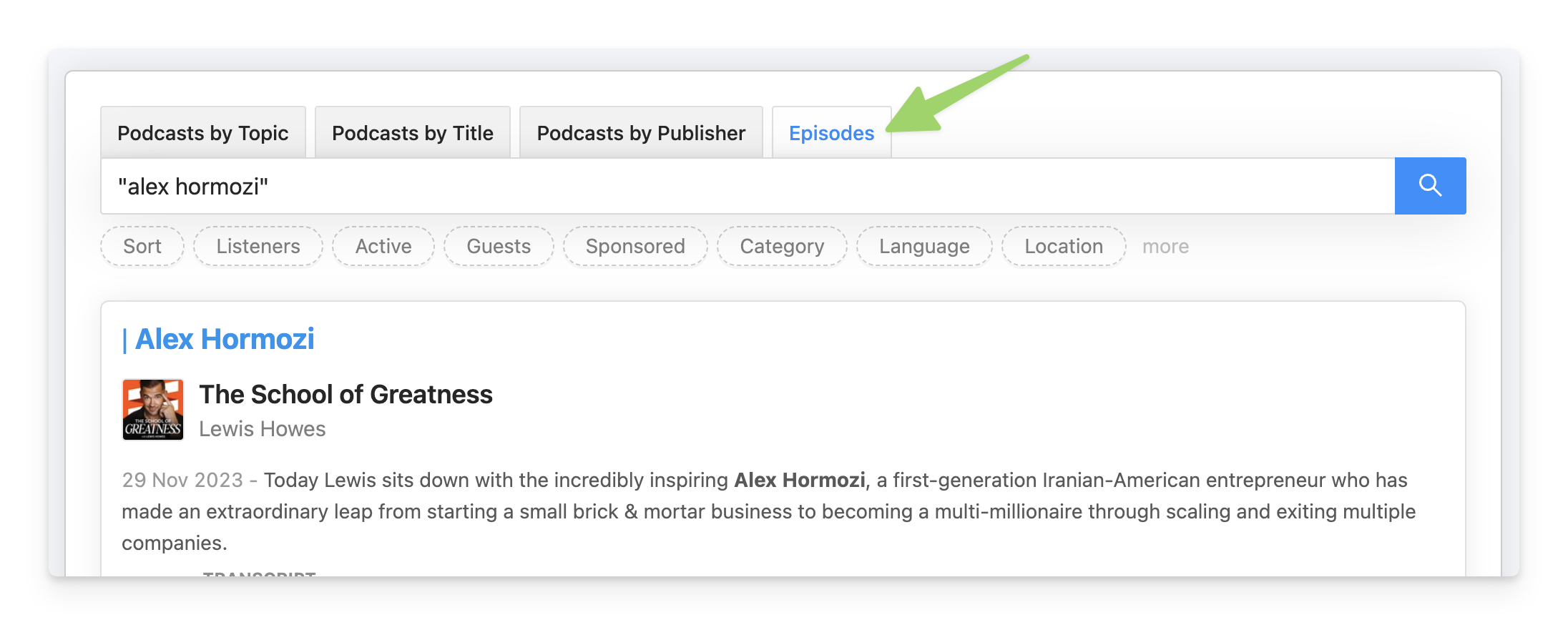
Example: Alex Hormozi's podcast appearances in 2023
Alex Hormozi guested on 15 podcasts, most of which were well-established shows which published daily or weekly episodes. The podcasts range between smaller, focused audiences to those with large audiences, which suggests Alex has a strategy of targeting both mass reach and specific niche audiences.
There's a clear pattern in categories that align with his expertise, showing that he's focused on building authority with audiences interested in multiple aspects of success.
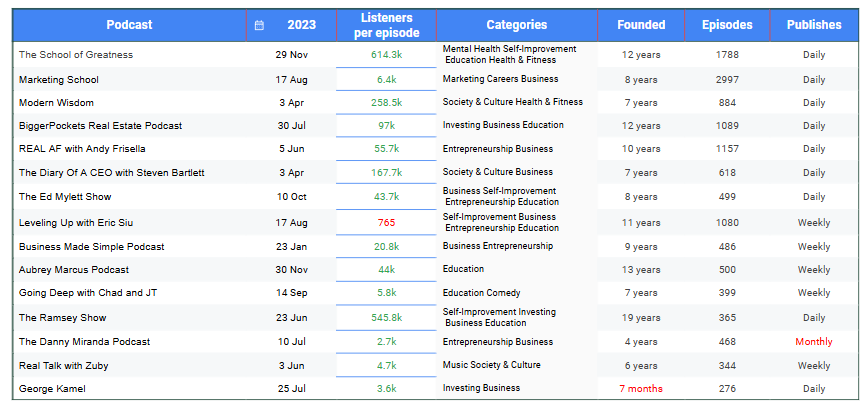
3. Look up podcast data
Check the podcast stats before booking an interview. Just because you've found a show that covers a topic you're interested in doesn't necessarily mean it's a good match.
Rephonic really makes a difference when you need to do more research. Each podcast data page includes:
- Overview: Key stats including listener numbers, whether it accepts guests, engagement scores, subscriber numbers across the various podcast apps and links to episodes, social media accounts and YouTube.
- Audience: Dig into listener demographics to see how well they match your target audience. Info includes a typical listener profile, location spread, stats on their likely age range, professions, relationship status and more.
- People: Info about the hosts and the guests who've recently appeared on the show.
- Sponsors: Includes who has recently sponsored the podcast, reveals their CTA and an audio clip.
- Feedback: Lists key themes from listeners' reviews, and links to the ratings and reviews in every app.
- Charts: The podcast's chart rankings across different countries and categories. View all charts or use the filters to narrow it down to particular countries and categories.
Think about your preferred podcast format, too.
Would you rather guest on interview-based podcasts where it's just you and the host or hosts? Do you prefer panel discussions where you're one of a few guests brought together to explore a topic. Or would a mixture of both work best with your goals?
Understanding your preferences will help you with ranking your podcast list in the next step.
4. Rank target podcasts
You've found a bunch of suitable podcasts. Now sort them into a list.
Start with aspirational shows—highly relevant podcasts with large audiences—at the top and work your way down. At the end of your list you'll still have shows that are highly relevant, but might have smaller audiences. Or the podcasters might be less established, with fewer episode numbers. These are the shows you should focus on first.
Think of it like a ladder. Take one step at a time and work your way up.
Aspirational shows are ones you shouldn't pitch yet. You'd likely get rejected or ghosted if you punch too far above your weight. Even if you did miraculously get booked as a guest, without guesting experience you risk giving a lack luster interview and wasting the opportunity.
Keep them for the future when you have a few episodes under your belt. Right now you need to practice and build up to them.
5. Identify how to add value
Increase your chances to get booked on podcasts by first identifying how you, your client or colleague can add value.
You might:
- Look for content gaps—what haven’t they discussed yet?
- Expand on a topic they’ve already covered—what new information, examples or stories might you add?
- Offer a fresh, contrasting perspective.
You can identifying shows where you might add value more easily by using Rephonic's episode transcript search. Watch this YouTube video to learn how to find great guest opportunities using Transcript Search.
6. Listen to podcast episodes
Of course, you must listen to at least one podcast episode to make sure a show is a good fit before you add them to your target list.
Consider these points while you listen:
- What's their interview style?
- Does it feel like you'd fit in with the podcast hosts?
- Is it relevant to you and your niche? Even when it looks good on paper, sometimes the style or content won't suit your brand.
- Look for ideas that you resonate with and note the episode number.
Use these later to personalize your outreach email.
Important - figure out where exactly listeners are in the funnel
7. Plan your schedule
Should you plan for monthly appearances across the year or intense bursts? Bear in mind that the lead time from pitch to episode release can take months.
Reach out early and try to book your preferred date in advance. Pitch too late and you might miss the boat. That's especially important if you want to do a podcast tour to coincide with a product or book launch.
Podcast tours are especially effective when I'm launching a new book or project, like a Kickstarter. I'll reach out to a curated list of podcasters whose audiences align with my target readers or customers. This concentrated burst of appearances helps to create momentum and build excitement around the launch.
Consider your goals when you plan your schedule, because the return on investment depends on your goals.
For example, if you aim to get backlinks, you'll get them as soon as the episode goes live. But, if your goal is to become a thought leader, it will take longer to build up trust and relationships with hosts and listeners.
Simon Sinek is an acknowledged thought leader and has appeared on many podcasts over the years, as this chart shows:
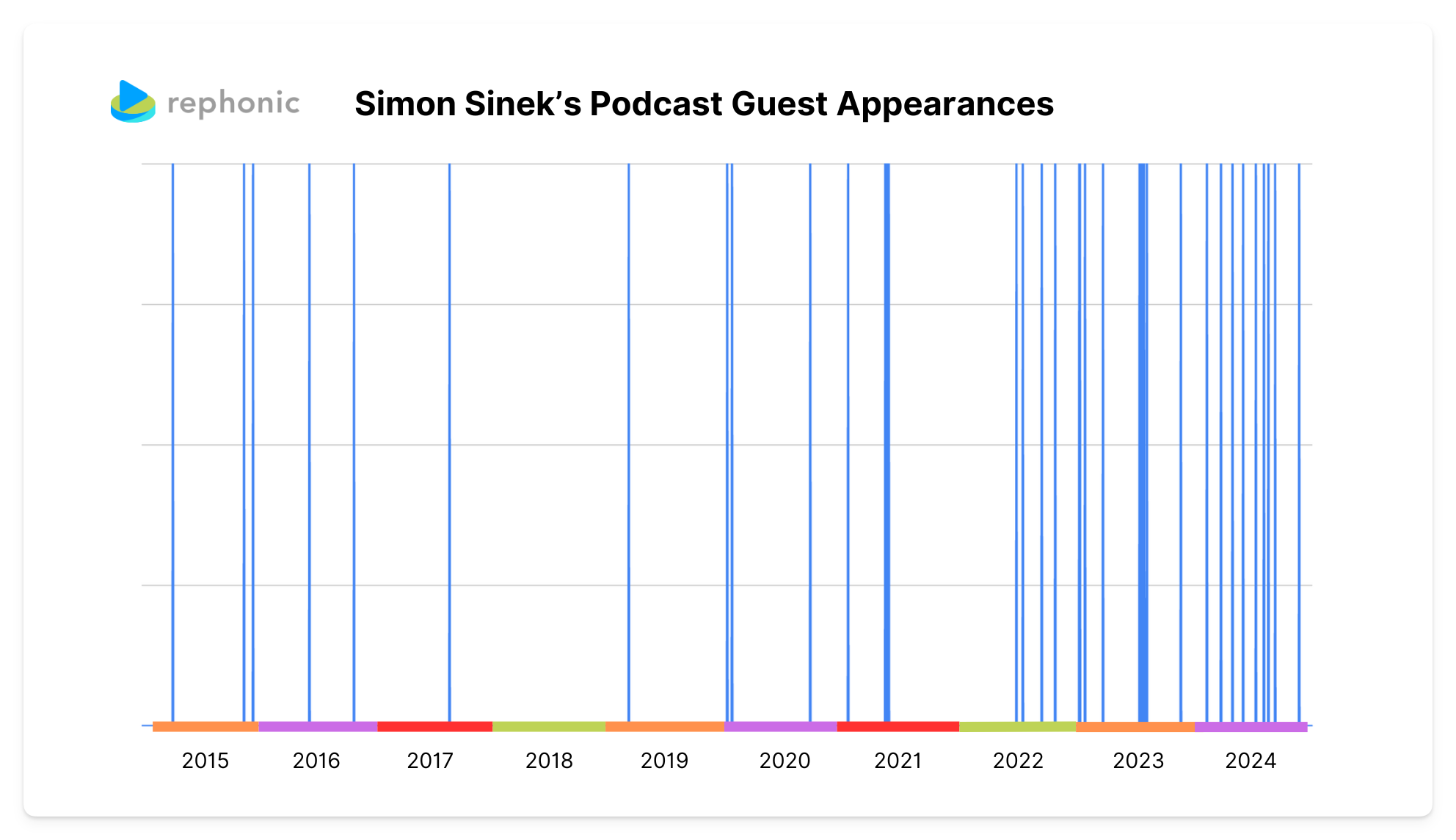
Ahrefs, one of the most recognisable names in marketing software, has maintained a relatively consistent podcast guesting schedule, managing a nine-month streak from October 2018 to June 2019:
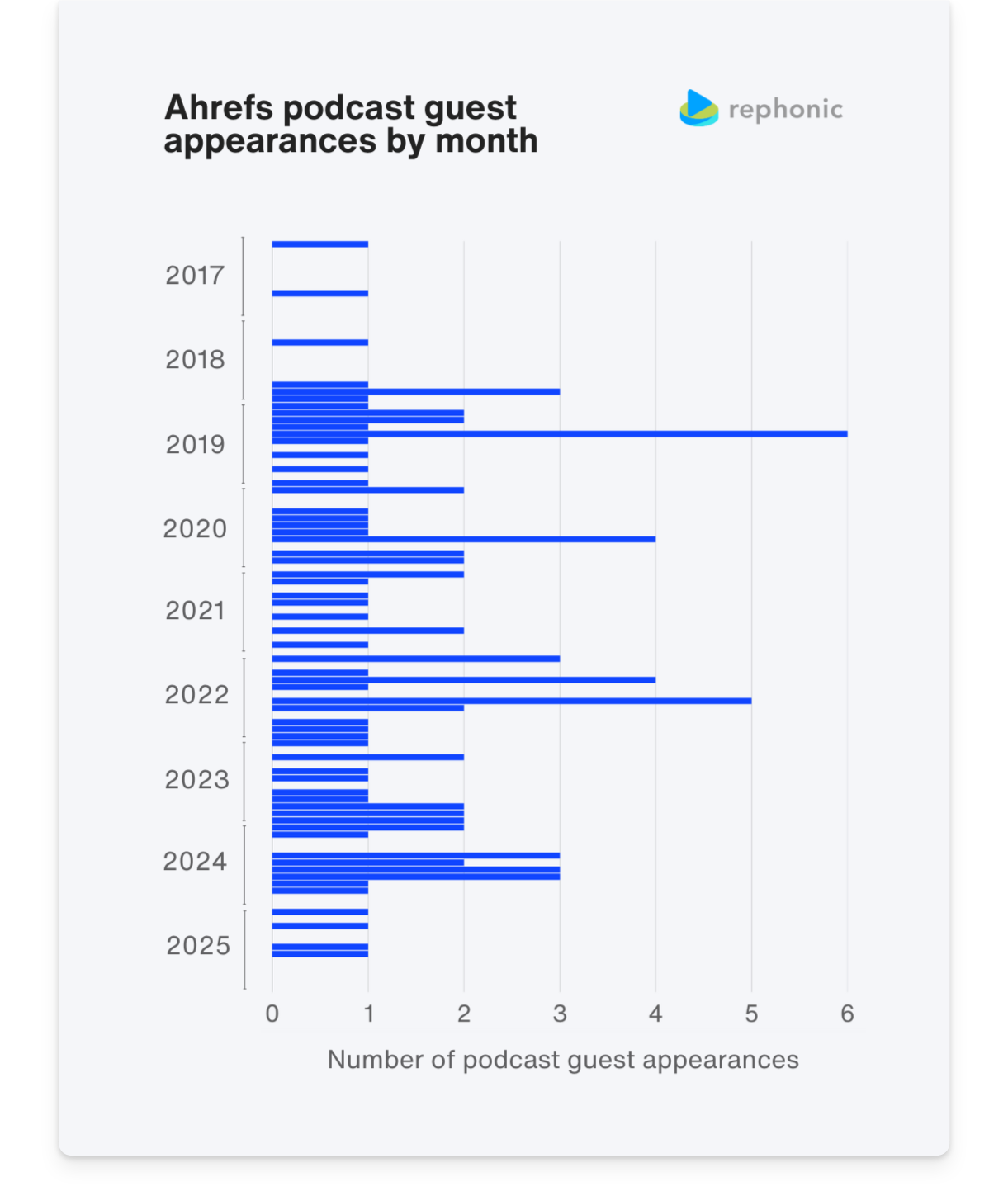
One thing is true for everyone - the sooner you get started, the sooner you'll see a return.
8. Pitch podcasts
Now you’ve got a list of potential shows. It’s time to write a podcast guest inquiry, aka your pitch.
While you can start with a podcast pitch template, always write to a specific podcast and personalize it. Many podcasts get a lot of generic emails, so the hosts can spot them a mile away. Your pitch can stand out by being personal, relevant and different.
Here's how:
- Tailor the subject line - it should feel personal and relevant to the host.
- Introduce yourself
- Use the host's name (you'd be amazed how many people get the host name or podcast title wrong.)
- Pitch unique talking points—here's where you show how you can add value
- Reference their previous content (including a recent episode.)
- Attach a one-sheet
- Follow-up after a week if you haven't heard back.
- Be genuine. Showing you're a real person who can genuinely help or interest their listeners will go a long way.
Top tip
Use this ChatGPT tool to draft personalised pitches in seconds.
Get the correct contact info
Rephonic lists each podcast's contact details on their page.
Some podcasts have guest enquiry forms or a get-in-touch link on their websites. You might also find their email or social media platforms via a manual Google search, or ask Hunter.io for help. (maybe send an email or maybe they have a guest enquiry form on their website.)

Prepare for a podcast interview
You've made a successful podcast pitch and won yourself a gig. Here's how to be an excellent guest:
1. Complete the vetting chat
Many shows will want to jump on a call with you first, to make sure your personality meshes and that you're a good fit. (If you're an agency, you and your client might jump on together.)
2. Prepare your recording equipment/space
If you’re recording in-person, the host or their publishing team will take care of the equipment. If you’re recording online, they’ll probably advise you on suitable equipment.
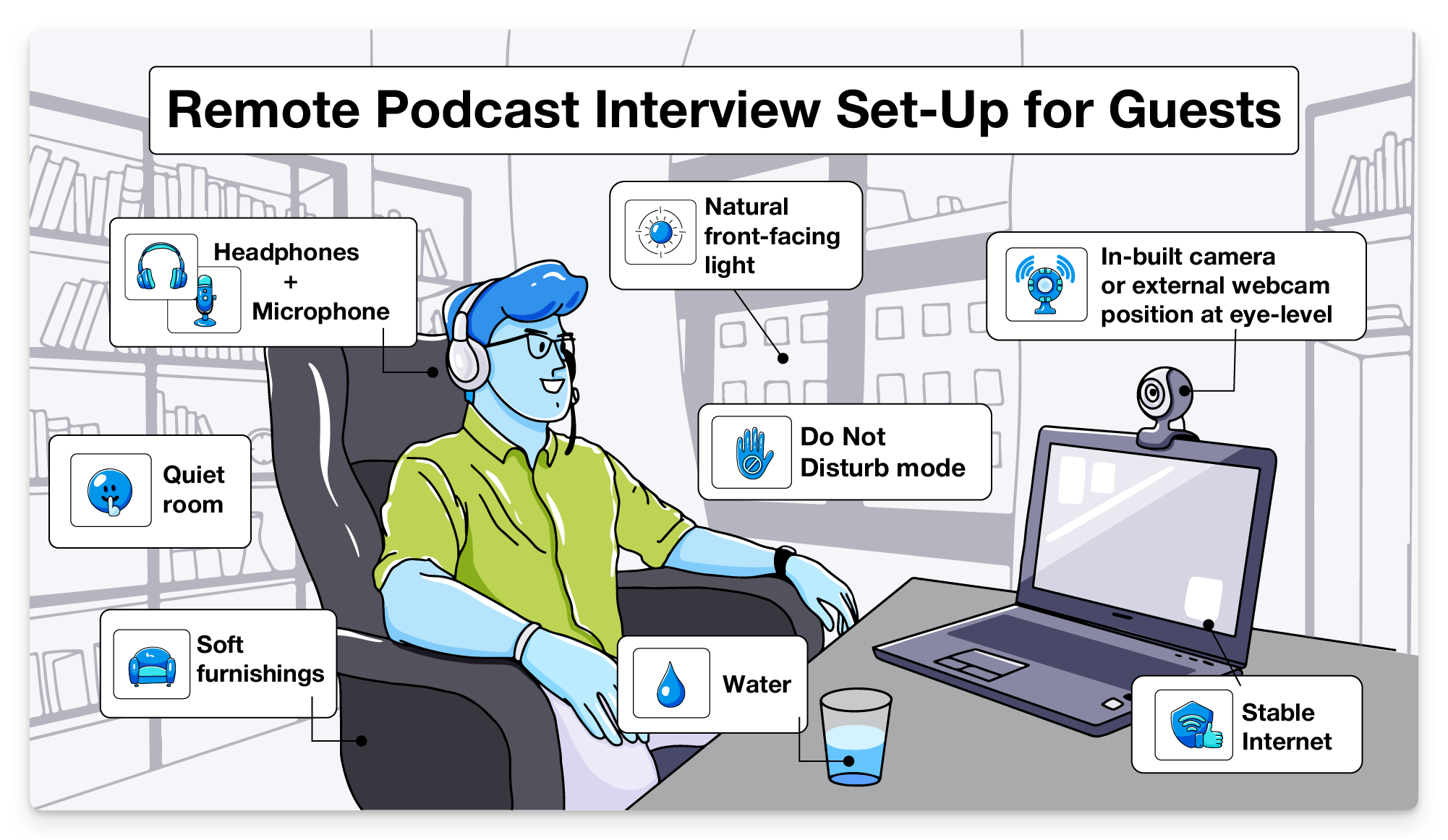
Ensure good audio quality
Use headphones or AirPods with a built-in microphone, or try separate headphones and a USB microphone to reduce the chance of creating a feedback loop. A pop filter is also useful to reduce sibilance ('ssss') and plosives (p and b sounds.)
Microphones capture your voice accurately and clearly, making it easier to balance volume during editing. Using your computer's default microphone can make you sound distant or muffled.
Record in a quiet space with soft furnishings because sounds can bounce off hard surfaces and cause unpleasant reverbs in the recording.
Consider visual aspects too
If you're making an online video recording, think about what's behind you. Choose a relevant background that looks good but won't distract the viewer.
Position yourself to fill as much as the camera frame as possible.
Finally, use a reliable internet connection to avoid lag times or the frustration of dropping in and out.
3. Choose a CTA
If you want listeners to take action after hearing your podcast interview, you'll need a CTA strategy, and you'll need to prepare this in advance.
First, know what you want to achieve from your podcast guest appearances. Understanding your goals helps you brainstorm the best CTAs to achieve them.
Once you've brainstormed, put the CTAs in two buckets. One will be a ‘high investment’ bucket, involving significant listener investment in either time or money. Make the other bucket ‘low investment,’ with minimal friction (visit my website, Instagram page or connect with me on LinkedIn."
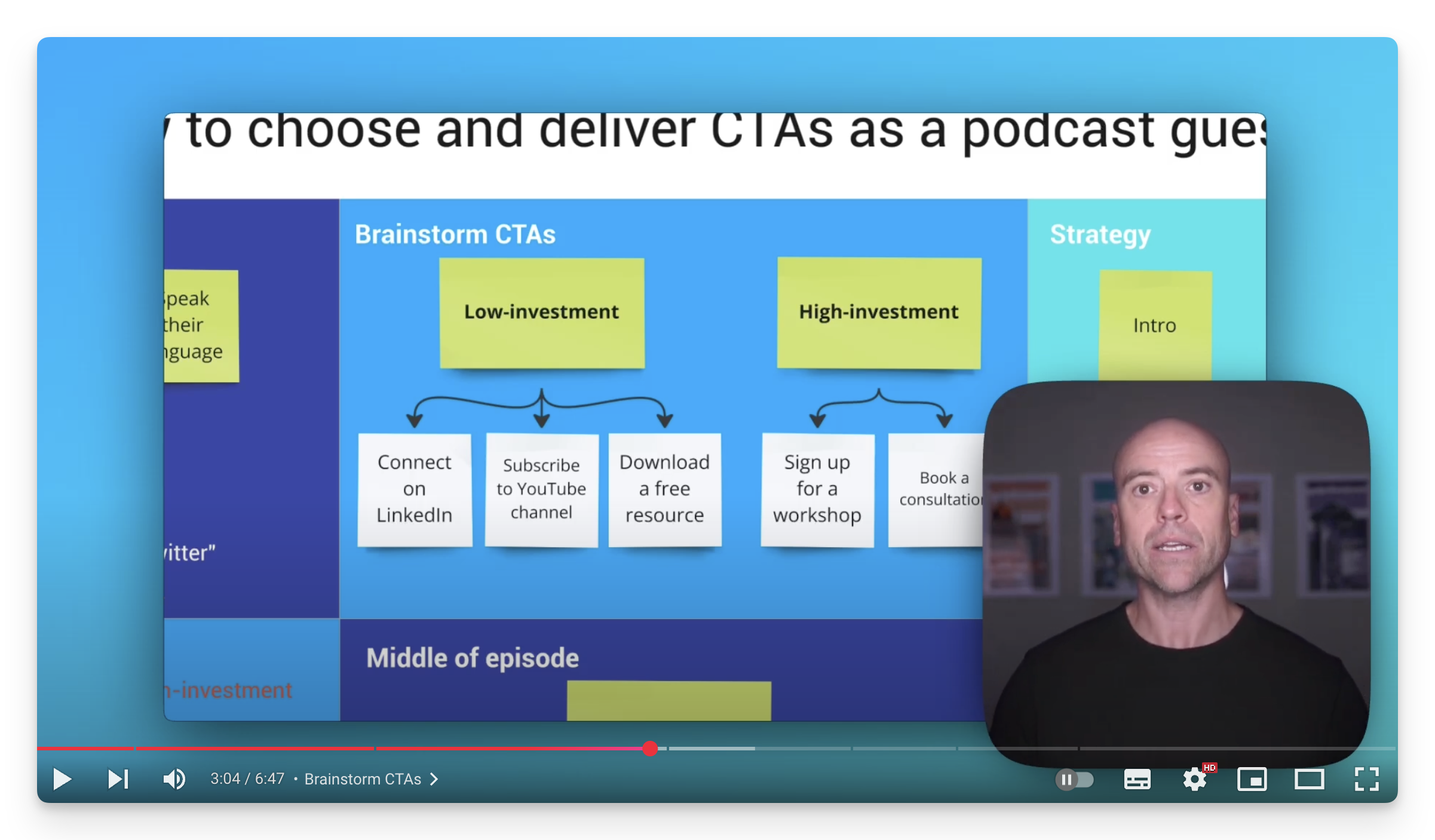
Then, generate curiosity about your high-investment CTA near the start of your interview. Hint at your low-investment CTAs again during the middle and give one of each when you wrap up the interview.
Finally, ask for links in show notes, to make it easier for listeners to act.

4. Prepare some stories
Stories illustrate your points and make them memorable, so have some stories in the locker ready for different occasions. They could be personal stories or illustrations of how you've helped customers and clients.
Use this classic storytelling structure: Hook, Challenge, Steps to Overcome, Tension, Takeaway to create your stories and double check their resonance with Jason Gunn's traffic light system.
It helps if you understand what kind of questions the host will ask, so you can figure out the types of stories that will fit. Hosts will often send a list of questions beforehand, especially if you ask. Otherwise, get the episode transcripts from Rephonic, feed them to ChatGPT or Claude and ask it to list the host's questions.
Then, decide which of your stories might fit those particular podcast listeners.
Think about what emotions you want your audience to feel. Then ask yourself - when have you felt that emotion? If you ask the right questions, your brain will come back with the right answers. So, if you were going to appear on a podcast and you wanted to tell a story that revealed how you're a bit of a worrier, ask yourself when was a time that I really worried about something?
5. Practice your intro
First impressions are important, so you want to prepare several versions of your origin story, so you can use one that fits a particular podcast. Prepare and practice, but try not to sound rehearsed.
Many hosts simply say "tell me about yourself" but others are more specific. Listen to some episodes and note which origin question the host tends to ask.
Part of your CTA strategy should be to generate curiosity around what you're offering in the intro so practice incorporating that into your origin story, too.
For example, when a podcast host asked Evy Poumpouras why they should stick around and listen to the episode, she said this:
I think, for each person, it's different. But why should you listen? At the core, we're always trying to become something better. I wrote my book, Becoming Bulletproof, and I think the essence of that was, I'm trying to become more than. And how about this? The day you think you know everything is the day you become obsolete. I live by that because I am never at my peak. I'm always becoming more. So if you're looking to become more and you don't know what that is exactly, then listen.
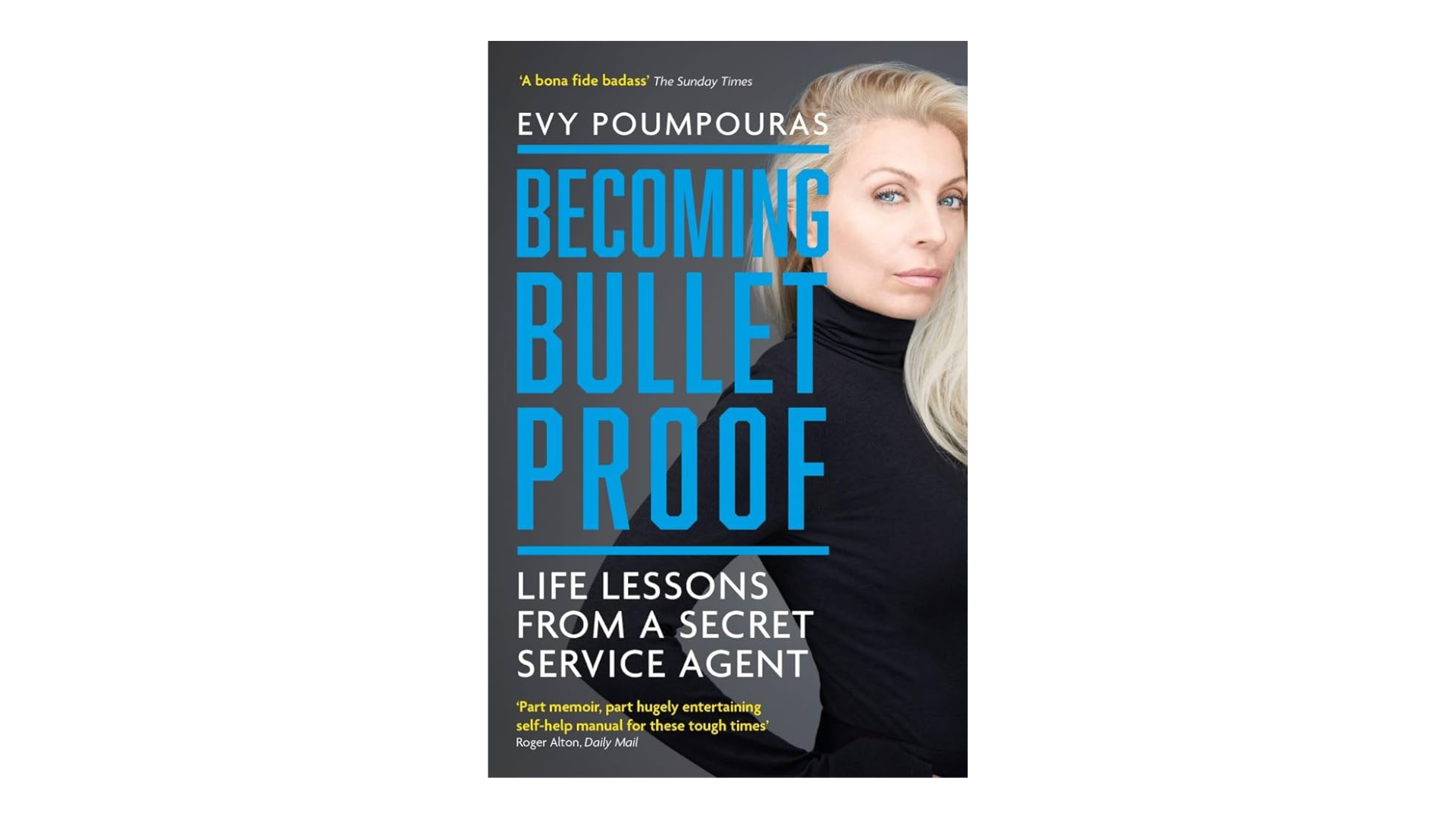
6. Practice talking in soundbites
Soundbites are short, memorable statements that encapsulate your point.
They're impactful, memorable, and easy to repurpose for social media—for you and the host.
Helpful Hints:
- Know your points inside and out
- Restate the question before you answer it to give context
- Sound natural
- Signal the end with your tone of voice
- Use a well-timed pause to emphasize the point
I think you can become confident in any skill by just doing it so many times that you get bored of doing it. And, as long as you don't let your first failure become your last, then it wasn't a failure. You will get there, but for now, you grind. And it will pay off either in what you build or who you become along the way.
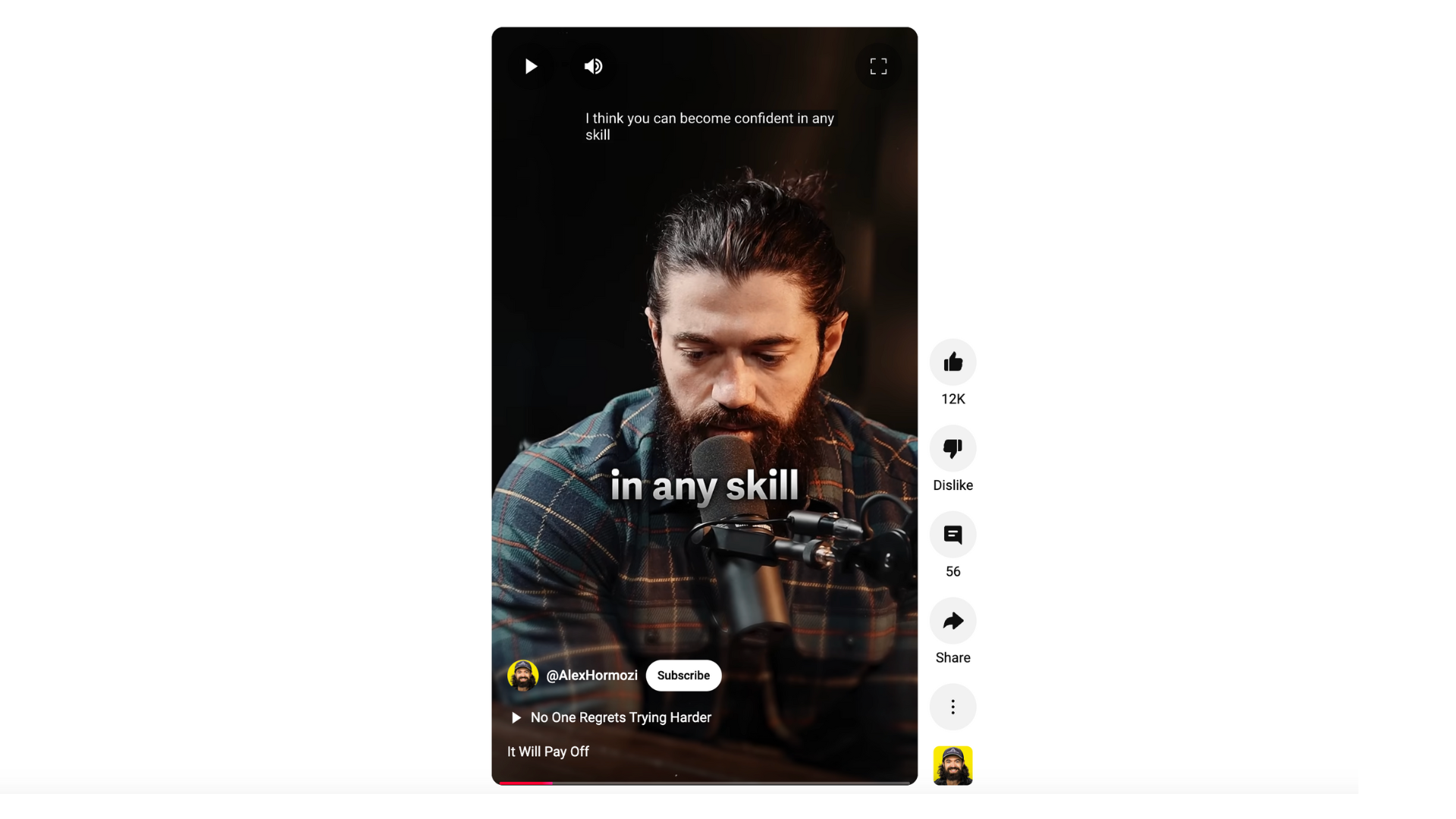

After the podcast interview
You can do a lot of things after your interview is recorded to maximize the impact of each podcast episode and pave the way for bigger and better opportunities.
Here are the biggest:
1. Leave a good lasting impression
Thank the host and let them know you genuinely appreciated being on their podcast.
You'll probably thank them verbally after recording stops, but it's a good idea to also do it in writing. You might send a thank you email (or even a card) or say thanks while giving a shoutout to the upcoming episode on social media.
2. Promote the episode
Set up an alert for episode release. Share the link straight away to be a good guest and to create a buzz around the episode.
Collect recordings and/or create video snippets to repurpose parts of your interview for social media. You'll find many tools to help you tailor your efforts for each platform. For example, you might choose Headliner or Descript for your video clips and Canva or Adobe to create quote graphic and text posts.
Schedule your posts on your website and social media. You can do this manually, or use an automatic scheduling tool such as Zapier or Buffer.
3. Measure impact
Has all the effort has been worth it?
Monitor results for a week or two after the episode goes live, but think long term, too. Podcast guesting results can keep coming long after your interview goes live.
Here's what you might track:
- Episode reach
- Website stats
- Social media metrics
- Email signups
- Sales and leads
- Audience feedback
- Peer recognition
Final thoughts
Getting in front of the right podcast audience is a powerful way to get your message out into the world. More than 500 million people now listen to podcasts, so being booked as a guest can gain customers for your business and mean more people recognize you as an expert.
Rephonic is the most complete podcast database for PR teams, marketers, and founders looking to book high-impact guest appearances and ad spots. Access listener numbers, contact info, audience demographics and more for over three million podcasts.
Want to take advantage of all that the podcasting world offers?
Article credits

Written by Lyn McNamee, podcast-PR writer with years of experience transforming podcast insights into practical, results-focused playbooks.

Edited by Becca Butcher, marketing specialist who frequently analyzes Rephonic’s data across 3 million podcasts.

How to Write a Podcast Outreach Email With AI (And What to Avoid)
Can AI help you write an effective podcast outreach email? Yes, but it won't give you a winning email at your first attempt. Be smart and use AI for research first. Here's how you do it.
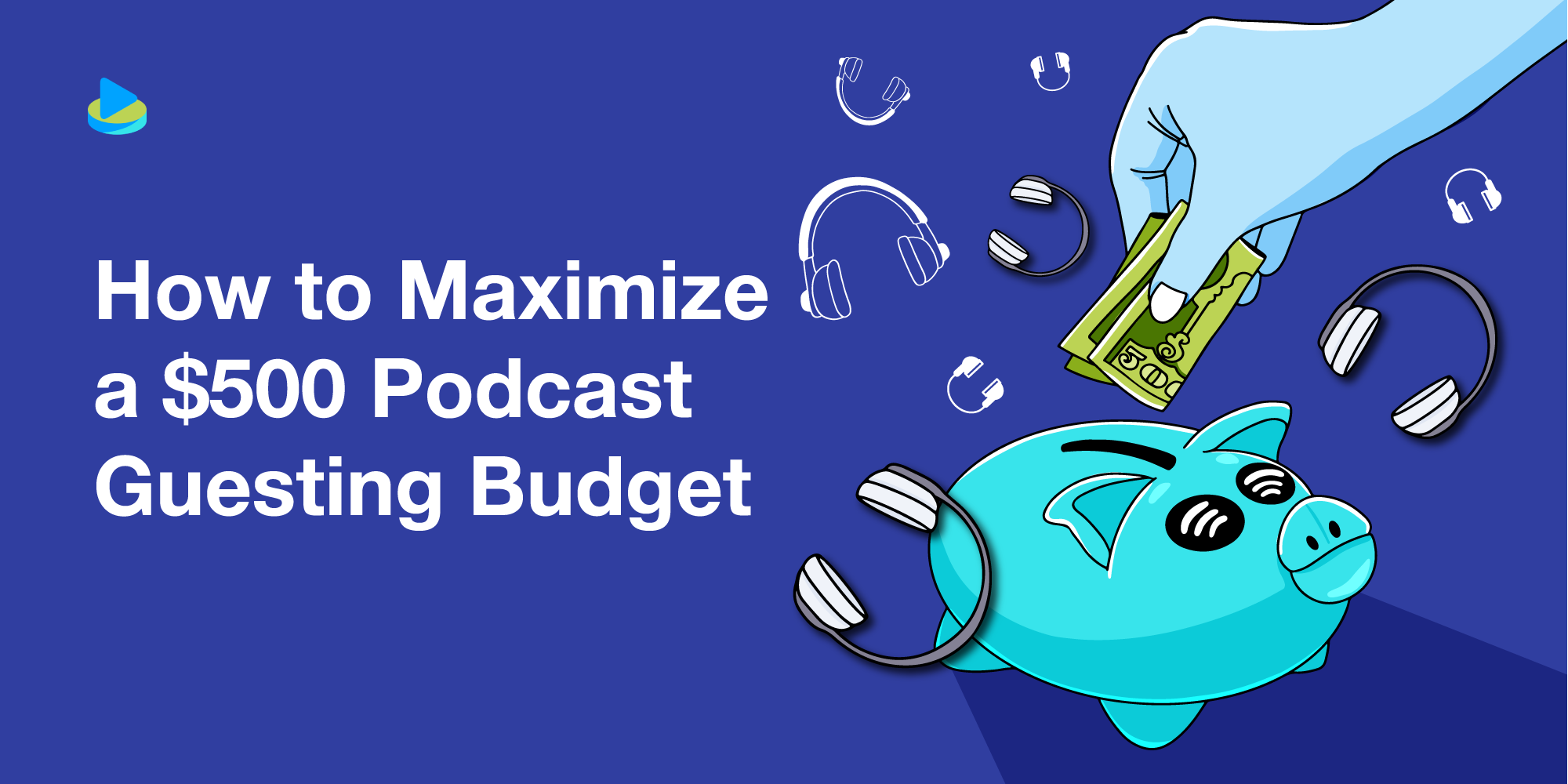
How to Maximize a $500 Podcast Guesting Budget
For entrepreneurs & marketing teams wanting to grow brand visibility, a podcast guesting budget of just $500 can set up a high-quality campaign.

![How to Get Booked on Podcasts as a Guest [2026 Guide]](/blog/content/images/size/w960/2025/02/get-booked-on-podcasts.png)
